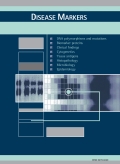Authors: Samy, Nervana | Hashim, Maha | Sayed, Magda | Said, Mohamed
Article Type:
Research Article
Abstract:
Background: Women with polycystic ovary syndrome (PCOS) have an increased prevalence of insulin resistance (IR) and related disorders. Elevated serum levels of high sensitivity CRP (hs-CRP), interleukin-6 (IL-6) and tumor necrosis factor α (TNF-α) reflect low-grade chronic inflammation and have been associated with several insulin-resistant states; they are useful cardiovascular risk markers. The objective of this study was to investigate whether soluble inflammatory markers are altered in PCOS focusing on its relationship
…with obesity and indexes of insulin resistance. Patients and methods: One hundred and eight women with PCOS and 75 healthy women were recruited. Patients were divided according to body mass index (BMI) into two groups; group I (BMI < 27 kg/m^{2} ) and group II (BMI ⩾ 27 Kg/m^{2} ). Serum levels of hs-CRP, IL-6, and TNF-α, lipid and hormone profiles were measured. Results: PCOS patients had increased levels of testosterone, luteinizing hormone (LH), androstendione, insulin level and HOMA index compared to healthy BMI matched controls. High-density lipoprotein (HDL) concentrations were significantly reduced in both patient groups compared to their controls, while triglyceride levels were significantly increased in obese group compared to controls. There were no significant difference in serum inflammatory markers hs-CRP, IL-6 and TNF-α between group I and their matched controls. On the other hand, there were significant increase in these markers between group II and their matched controls. There were highly significant positive correlation between hs-CRP and IL-6 (r=0.702, P< 0.001) and between hs-CRP and TNF-α (r=0.621, P<0.001), also between IL-6 and TNF-α (r=0.543, P< 0.001). These inflammatory markers correlated significantly with BMI and HOMA index. Multiple regression analysis revealed that BMI and HOMA were predictors of IL-6 levels (b=11.173, P< 0.001, b=13.564, P< 0.001 respectively) and BMI was the only predictor of hs-CRP levels (b=12.578, P< 0.001) and TNF-α levels (b=0.134, P<0.001). Conclusion: PCOS and obesity induce an increase in serum inflammatory cardiovascular risk markers. The precise mechanisms underlying these associations require additional studies to clarify the state of the cardiovascular system in women with PCOS compared with controls in large numbers of patients to determine the relative contribution of different factors including insulin resistance, androgen status and BMI.
Show more
Keywords: Polycystic ovary syndrome, inflammatory markers, insulin resistance, BMI
DOI: 10.3233/DMA-2009-0627
Citation: Disease Markers,
vol. 26, no. 4, pp. 163-170, 2009
Price: EUR 27.50





